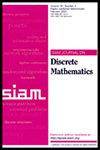不要掷骰子,要问两次:匹配问题及其他问题的两次查询失真
IF 0.9
3区 数学
Q2 MATHEMATICS
引用次数: 0
摘要
SIAM 离散数学杂志》,第 38 卷第 1 期,第 1007-1029 页,2024 年 3 月。 摘要在大多数社会选择环境中,参与的代理人以线性排序的形式表达他们对不同备选方案的偏好。虽然这明显简化了偏好激发,但却不可避免地导致在优化诸如社会福利之类的有意义目标时表现不佳,因为参与者的价值观几乎是未知的。这种因缺乏信息而造成的绩效损失可以用失真概念来衡量。最近的一系列工作提出了这样一个议程,即设计一种机制,通过查询了解代理对少量备选方案的价值,并利用这些有限的额外信息做出更明智的决策,从而改善失真。根据这一议程,我们在这项工作中将重点放在一类组合问题上,其中包括大多数众所周知的匹配问题及其一些泛化问题。对于单面匹配、双面匹配、一般图匹配和短周期打包等问题,我们设计的双查询机制在社会福利方面实现了最佳的最坏情况失真,并优于随机序数机制实现的最佳预期失真。当[math]被限制为任意常数时,我们的结果可以扩展到[math]-受限资源分配、一般图[math]-匹配和[math]-斜线打包等问题。本文章由计算机程序翻译,如有差异,请以英文原文为准。
Don’t Roll the Dice, Ask Twice: The Two-Query Distortion of Matching Problems and Beyond
SIAM Journal on Discrete Mathematics, Volume 38, Issue 1, Page 1007-1029, March 2024.
Abstract. In most social choice settings, the participating agents express their preferences over the different alternatives in the form of linear orderings. While this clearly simplifies preference elicitation, it inevitably leads to poor performance with respect to optimizing a cardinal objective, such as the social welfare, since the values of the agents remain virtually unknown. This loss in performance because of lack of information is measured by the notion of distortion. A recent array of works put forward the agenda of designing mechanisms that learn the values of the agents for a small number of alternatives via queries, and use this limited extra information to make better-informed decisions, thus improving distortion. Following this agenda, in this work we focus on a class of combinatorial problems that includes most well-known matching problems and several of their generalizations. For problems such as One-Sided Matching, Two-Sided Matching, General Graph Matching, and Short Cycle Packing, we design two-query mechanisms that achieve the best-possible worst-case distortion in terms of social welfare, and outperform the best-possible expected distortion achieved by randomized ordinal mechanisms. Our results extend to problems like [math]-Constrained Resource Allocation, General Graph [math]-Matching, and [math]-Clique Packing, when [math] is restricted to be any constant.
Abstract. In most social choice settings, the participating agents express their preferences over the different alternatives in the form of linear orderings. While this clearly simplifies preference elicitation, it inevitably leads to poor performance with respect to optimizing a cardinal objective, such as the social welfare, since the values of the agents remain virtually unknown. This loss in performance because of lack of information is measured by the notion of distortion. A recent array of works put forward the agenda of designing mechanisms that learn the values of the agents for a small number of alternatives via queries, and use this limited extra information to make better-informed decisions, thus improving distortion. Following this agenda, in this work we focus on a class of combinatorial problems that includes most well-known matching problems and several of their generalizations. For problems such as One-Sided Matching, Two-Sided Matching, General Graph Matching, and Short Cycle Packing, we design two-query mechanisms that achieve the best-possible worst-case distortion in terms of social welfare, and outperform the best-possible expected distortion achieved by randomized ordinal mechanisms. Our results extend to problems like [math]-Constrained Resource Allocation, General Graph [math]-Matching, and [math]-Clique Packing, when [math] is restricted to be any constant.
求助全文
通过发布文献求助,成功后即可免费获取论文全文。
去求助
来源期刊
CiteScore
1.90
自引率
0.00%
发文量
124
审稿时长
4-8 weeks
期刊介绍:
SIAM Journal on Discrete Mathematics (SIDMA) publishes research papers of exceptional quality in pure and applied discrete mathematics, broadly interpreted. The journal''s focus is primarily theoretical rather than empirical, but the editors welcome papers that evolve from or have potential application to real-world problems. Submissions must be clearly written and make a significant contribution.
Topics include but are not limited to:
properties of and extremal problems for discrete structures
combinatorial optimization, including approximation algorithms
algebraic and enumerative combinatorics
coding and information theory
additive, analytic combinatorics and number theory
combinatorial matrix theory and spectral graph theory
design and analysis of algorithms for discrete structures
discrete problems in computational complexity
discrete and computational geometry
discrete methods in computational biology, and bioinformatics
probabilistic methods and randomized algorithms.

 求助内容:
求助内容: 应助结果提醒方式:
应助结果提醒方式:


